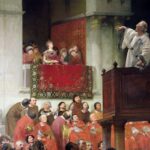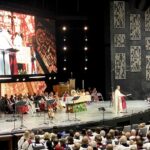Israel is a racist state, and Middle East peace is threatened by an onset of Christian Zionist theology, according to a prominent Anglican priest. Naim Ateek is a vocal critic of Israel and the founder of Sabeel, an ecumenical center in Jerusalem that promotes liberation theology among Palestinian Christians.
Currently on a 20-day tour of the United States, Ateek is promoting his latest book “A Palestinian Christian Cry for Reconciliation.” The book is an analysis of the conflict over land between Palestinians and Israelis.
Anglican Priest and Palestinian Christian author Naim Ateek began his U.S. book tour in Washington, D.C. |
On February 22, Ateek spoke at the Potter’s House, a bookstore in the Adams Morgan neighborhood of Washington, D.C., operated by the non-denominational Potter’s House church. The store bills itself as a place for “innocent conversation, work meetings, worship or subversive activism” according to the organization. The Episcopal community has been especially welcoming to Ateek, inviting him to speak at St. Mark’s Church on Capitol Hill, as well as at Episcopal churches in Detroit and Chicago.
Ateek introduced his book by explaining that it includes history and politics, but also theology.
“I’m trained in theology, but I’m also dealing with political realities,” Ateek said. “Those of us with faith cannot talk about the conflict from purely political terms.”
With that acknowledgement made, Ateek said that the conflict itself between Israelis and Palestinians was largely political.
“The conflict didn’t begin as a religious one, but since 1967, especially, it has become more religious,” Ateek said, adding that he thought a resolution of conflict would have to be based on international law, not biblical interpretation.
“There are exclusive texts in the Bible that I totally reject, and inclusive ones I embrace,” Ateek said, specifically addressing contention over the city of Jerusalem, where he has lived in the city’s eastern section for the past 24 years.
“It is very easy to fall into an exclusive theology about land in the Bible. That is the easy way. I try to critique that.”
Ateek suggested the possibility of making Jerusalem a federal capital of several states, such as Jordan, Lebanon, Israel and Palestine. He also addressed the larger dispute between Israelis and Palestinians over boundaries and security.
“The most ideal solution is the one state solution,” Ateek said, referring to an option that would allow unconditional right of return to Palestinian refugees from the 1948 war, but that would effectively swamp Israel demographically.
“I propose the two-state solution,” Ateek said, referring to an option that would create separate Palestinian and Israeli states living side by side. “I would love to see the ideal take place, but realistically we need to move to a two state solution.”
Ateek has used the word racism to describe Israel at past conferences organized by Sabeel. One listener at Sunday’s presentation asked if using “racism” as a word is helpful.
“On the ground, it is a fact,” said Ateek. “It might be helpful for people to be shocked by it, to be moved. Israel has become a racist state, whether we like it or not. This is the greatest challenge facing Israel today.”
Ateek devotes an entire chapter of his book to denouncing what he termed the “dangerous phenomenon” of Christian Zionism in the United States.
“When you talk about Anti-Semitism, Christian Zionism is the worst,” Ateek said, criticizing the eschatological views of some evangelicals for their lack of accommodation for Jewish peoples. While Ateek said that some Jews don’t like Christian Zionists’ theology, “they like their money.”
Ateek was quick to qualify that not every evangelical is a Christian Zionist. He also praised a letter to President Bush signed by 40 evangelical pastors that called for a more active U.S. role in Middle East peacemaking. Ateek also singled out evangelical left leaders like Jim Wallis of Sojourners for their outspokenness on behalf of Palestinians.
While Ateek had plenty of criticism for Israel, he had sparse comments on Palestinian organizations like Hamas and Fatah.
“Unfortunately, we have a corrupt leadership,” Ateek said. “Everyone in the Arab world knows it.” Ateek was quick to point blame back in the direction of Israel, however. He cited Israeli assassinations of younger Palestinian leaders as a chief cause of older, compromised leaders holding office.
Ateek directly blamed the existence of Hamas on Israel, saying that the organization was essentially fostered by Israel in order to provide an internal challenge to the Palestine Liberation Organization. Hamas was encouraged by Israel because “they knew religion was the easiest way to break people up in the Middle East,” Ateek claimed.
The new administration in Washington was a source of optimism for Ateek. “I believe we have a window of opportunity with the new administration,” he said, citing openness to change in the recent election, change that he said is needed in the U.S. policy on Israel.
“Previous administrations have allowed Israel to get away with murder, literally,” Ateek said. “I think it is really sad that some of these people [in Israel] are fascists.”
When asked what U.S. Christians could do to assist Palestinians, Ateek said that what was really needed was political advocacy. “We need the voices of the Christian churches.”
Ateek said that the U.S. campaign to End the Occupation, an umbrella organization that includes Sabeel’s U.S. branch, “is really the heart of the matter.”
“Most of your mainline churches have the best resolutions on ending the occupation,” Ateek said, while singling out Episcopalians, Lutherans and UCC by name for their past opposition to Israel.
“Unfortunately, most people don’t know their church decisions, and that is tragic,” Ateek said.
No comments yet





Leave a Reply